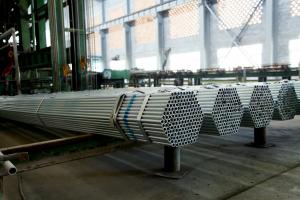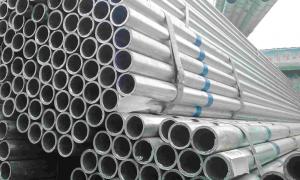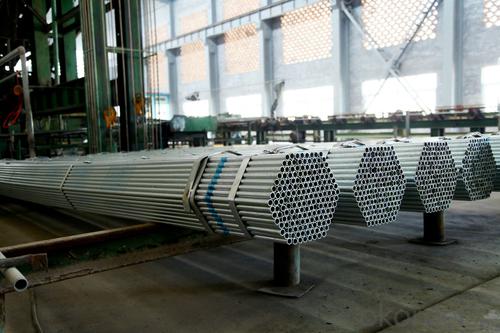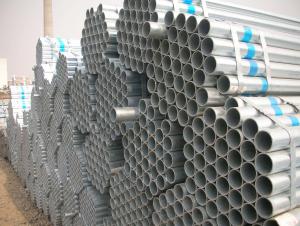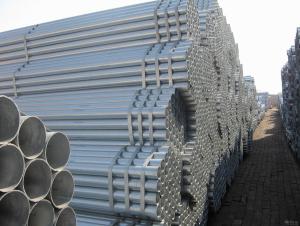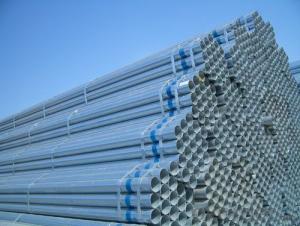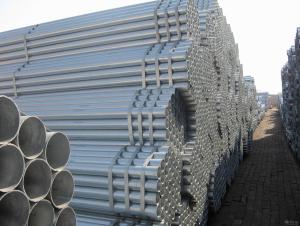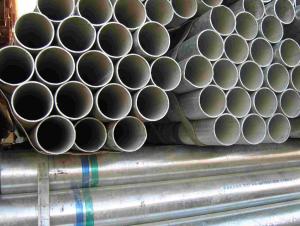Galvanized pipe ASTM A53 100g/200g hot dipped / pre galvanized pipe
- Loading Port:
- Tianjin
- Payment Terms:
- TT or LC
- Min Order Qty:
- 40 m.t.
- Supply Capability:
- 9000 m.t./month
OKorder Service Pledge
OKorder Financial Service
You Might Also Like
1、 Galvanized pipe ASTM A53 100g/200g hot dipped / pre galvanized pipe:
The surface of Galvanized pipe ASTM A53 100g/200g hot dipped / pre galvanized pipecan increase the corrosion resistance of the steel tube, prolong service life. Galvanized pipe is widely used, in addition to water, gas, oil and other general low pressure fluid pipelines. It is also used in the petroleum industry, especially for offshore oil field of oil well pipe and oil pipe, chemical, coking equipment of oil heater, condensation cooler, coal run oil exchanger tube, and trestle pile, the mine tunnel support frame tube.
2、Main Features of Galvanized pipe ASTM A53 hot dipped / pre galvanized pipe:
• High manufacturing accuracy with standard
• Small inertia resistance
• Strong heat dissipation ability
3、Galvanized pipe ASTM A53 100g/200g hot dipped / pre galvanized pipe Specification:
Standard | GB, DIN, ASTM ASTM A106-2006, ASTM A53-2007 |
Grade | 10#-45#, 16Mn 10#, 20#, 45#, 16Mn |
Thickness | 1 - 33 mm |
Section Shape | Round |
Outer Diameter | 21 - 610mm |
Place of Origin | Tianjin, China (Mainland) |
Secondary Or Not | Non-secondary |
Application | Hydraulic Pipe |
Technique | Cold Drawn |
Certification | API |
Surface Treatment | factory state or painted black |
Special Pipe | API Pipe |
Alloy Or Not | Non-alloy |
Length | 5-12M |
Outer Diameter | 21.3-610mm |
Grade | 20#, 45#, Q345, API J55, API K55, API L80, API N80, API P110, A53B |
Standard | ASME, ASTM |
1) Material:20#(ASTM A 106/A53 GRB.API5LGRB,GB),45#,16Mn,10#.
2) Specification range:OD:21.3-610mm,WT:6-70mm,length:6-12m or according to the requirement of clients.
3) Excutive standards:GB,ASME API5L.ASTM A 106/A53,Despite of the above standards,we can also supply seamless steel pipe with standard of DIN,JIS,and so on,and also develop new products according to the requirements of our clients!
4) Surface:black lacquered,varnish coating or galvanized.
4、Packaging & Delivery
Packaging Details: | seaworthy package,bundles wrapped with strong steel strip |
Delivery Detail: | 15-30days after received 30%TT |
5、FAQ of Galvanized pipe ASTM A53 100g/200g hot dipped / pre galvanized pipe:
①How is the quality of your products?
Our products are manufactured strictly according to national and internaional standard, and we take a test
on every pipe before delivered out. ②How about price?
Yes, we are factory and be able to give you lowest price below market one, and we have a policy that “ for saving time and absolutely honest business attitude, we quote as lowest as possible for any customer, and discount can be given according to quantity”,if you like bargain and factory price is not low enough as you think, just don’t waste your time.Please trust the quotation we would give you, it is professional one.
③Why should you chose us?
Chose happens because of quality, then price, We can give you both.Additionally, we can also offer professional products inquiry, products knowledge train
6、 Galvanized pipe ASTM A53 100g/200g hot dipped / pre galvanized pipe: Images:
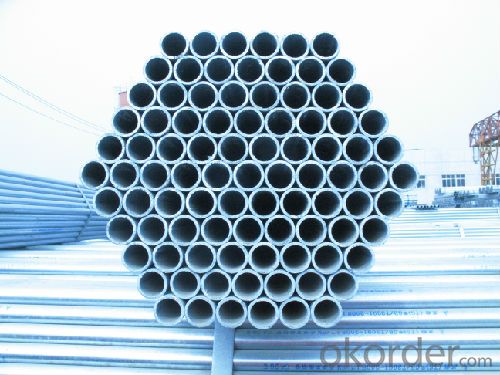
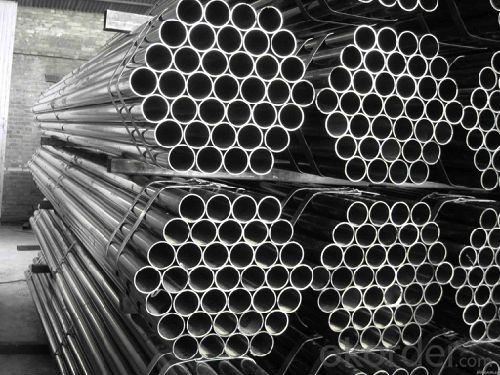
- Q: What is the difference between steel pipes and PVC-M pipes?
- Steel pipes are made of a strong and durable metal, while PVC-M pipes are made of a thermoplastic material known as polyvinyl chloride modified. The main difference lies in their composition and characteristics. Steel pipes are typically heavier and more robust, offering greater strength and resistance to high pressure and temperature. On the other hand, PVC-M pipes are lightweight, flexible, and corrosion-resistant, making them ideal for applications where chemical resistance and ease of installation are crucial factors.
- Q: What are the different methods of testing steel pipes?
- There are several methods used for testing steel pipes, including visual inspection, ultrasonic testing, radiographic testing, magnetic particle testing, and hydrostatic testing. Visual inspection involves examining the pipes for any surface defects or abnormalities. Ultrasonic testing uses sound waves to detect flaws or inconsistencies within the pipes. Radiographic testing involves using X-rays or gamma rays to produce images of the pipes and identify any defects. Magnetic particle testing uses magnetic fields and magnetic particles to detect surface or near-surface defects in the pipes. Hydrostatic testing involves pressurizing the pipes with water to ensure they can withstand the specified pressure without leaks or failures.
- Q: How are steel pipes used in the manufacturing of offshore wind turbines?
- Steel pipes are used in the manufacturing of offshore wind turbines for various purposes such as supporting the turbine structure, housing electrical cables, and transporting fluids like hydraulic oil and cooling water. These pipes provide structural strength, corrosion resistance, and durability, ensuring the stability and functionality of the turbines in the harsh offshore environment.
- Q: What is the compressive strength of steel pipes?
- The compressive strength of steel pipes can vary due to several factors, including the grade of steel, the manufacturing process, and the dimensions of the pipes. On average, steel pipes have a compressive strength ranging from 250 MPa to 650 MPa. The higher the grade of steel used, the greater the compressive strength tends to be. Moreover, larger diameter pipes typically exhibit a higher compressive strength compared to smaller ones. It's worth noting that the compressive strength of steel pipes can also be affected by temperature, corrosion, and external loads. Therefore, it is essential to refer to specific standards, specifications, or manufacturer's data to obtain accurate and detailed information about the compressive strength of a particular steel pipe.
- Q: Can steel pipes be used for underground fuel storage tanks?
- Underground fuel storage tanks can indeed utilize steel pipes. These pipes find wide application in various fields, including underground fuel storage tanks. Their strength, durability, and resistance to corrosion enable them to serve as suitable long-term storage options for fuels like gasoline, diesel, and oil. Moreover, the weldability of steel pipes allows for the creation of seamless and secure tank structures. Nevertheless, it is crucial to ensure that the steel pipes employed in underground fuel storage tanks are appropriately coated with corrosion-resistant materials. This precautionary measure shields the pipes from potential damage that may arise due to exposure to moisture or the chemicals present in the fuel. Consistent inspection and maintenance procedures are also imperative to uphold the tank's integrity and avert leaks or environmental hazards.
- Q: Can steel pipes be used for wastewater treatment facilities?
- Yes, steel pipes can be used for wastewater treatment facilities. Steel pipes are commonly used in wastewater treatment plants due to their durability, strength, and resistance to corrosion. They can efficiently transport and distribute wastewater throughout the facility, ensuring its proper treatment and disposal. Additionally, steel pipes can withstand the harsh conditions and chemicals often present in wastewater treatment processes, making them a reliable choice for this application.
- Q: What is the buckling type thin-wall steel pipe? What is a tight set of thin-walled steel tubes? What's the difference between the two?
- The thread of the tightening (JDG) joint is unified with an outer thread, a wall thickness of 1.5mm, and a button (KBG). The thread of the joint is an internal thread, and the wall thickness is 1.0mm. Withholding type joint for the use of the same company and pipe connection to matching products with complete connection clamp buckle. Fastening and pressing type correctly connected and locked after no need to do a cross ground.
- Q: How to make the internal tooth of the steel pipe?
- At present, in our country, 300MW or 600MW or more large capacity sub critical and supercritical thermal power boilers are designed or imported abroad. Membrane internal wall tubes are widely used in membrane water wall.
- Q: Can steel pipes be used for underground water wells?
- Yes, steel pipes can be used for underground water wells. Steel pipes are commonly used for drilling water wells due to their durability, strength, and resistance to corrosion. However, it is important to ensure that the steel pipes are properly coated and protected to prevent any contamination of the underground water source.
- Q: What is the role of steel pipes in the construction of bridges?
- Steel pipes play a crucial role in the construction of bridges as they are used for various purposes such as supporting the weight of the bridge, providing structural integrity, and allowing for the flow of fluids or gases. Steel pipes are often used as support columns or piles in bridge foundations, providing stability and strength to the structure. They are also used for constructing bridge piers, trusses, and beams, ensuring the bridge can withstand heavy loads and forces. Additionally, steel pipes can be utilized for the transportation of water, gas, or other fluids across the bridge, making them essential for the overall functionality and longevity of the bridge.
Send your message to us
Galvanized pipe ASTM A53 100g/200g hot dipped / pre galvanized pipe
- Loading Port:
- Tianjin
- Payment Terms:
- TT or LC
- Min Order Qty:
- 40 m.t.
- Supply Capability:
- 9000 m.t./month
OKorder Service Pledge
OKorder Financial Service
Similar products
Hot products
Hot Searches
Related keywords
